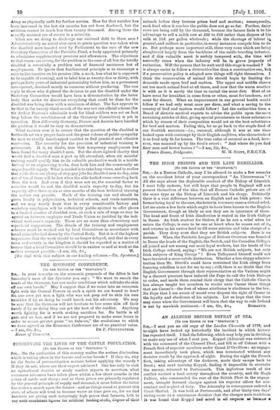THE IRISH PRIESTS AND THE LATE REBELLION. ere THIll EDITOR
OF THE " Sexemix0l."1 Sra,—As a Roman Catholic, may I be allowed to make a few remarks on the excellent letter of your correspondent "An Ulsterwoman "1 All she says about the deplorable conduct of the Bishop of Limerick I most fully endorse, but still hope that people in England will nob possess themselves of the idea that all Roman Catholic: priests are of the same type as the Bishop of Limerick and his clergy. Politically there is a vast difference between an English and an Irish priest : the former being loyal to the core, the latter in too many cases a virtual rebel. Let me state a few facts which ought to have been known to the English Government, though as likely as not they are in ignorance of them. The head and fount of Irish disaffection is seated in the Irish College in Rome. An Irish student for Orders, if he be not a rebel when he enters the College, is sure to be one at heart when he comes out of it, and returns to his native land to fill some mission and take charge of a parish. They deny even that they are British subjects. Here is an instance. When the Patriotic League of Britons Overseas was founded in Rome the heads of the English, the Scotch,and the Canadian Colleges all joined and are among our most loyal workers, but the heads of the Irish College refused, saying "We are not British subjects, but only Irish subjects of King George " I Even Talle3rrand himself could not have invented a more subtle distinction. Whether a less sloppy adminis- tration than Mr. Birrell's could have restrained the Irish clergy from fostering rebellion is not for me to say ; still, there is no doubt that the English Government through their representative at the Vatican might by a discreet pressure have induced the Pope to call the Irish Bishops to order, and made them remind their clergy that the Catholic Church has always taught her members to render unto Caesar those things that are Caesar's—the first of whose attributes is obedience to the law. No Pope that I am aware of would ever dispute the right of Caesar to the loyalty and obedience of his subjects. Let us hope that the time may come when the Government will learn that the way to rule Ireland is not by mawkish sentiment.—! am, Sir, he., ROMANIIS.










































 Previous page
Previous page